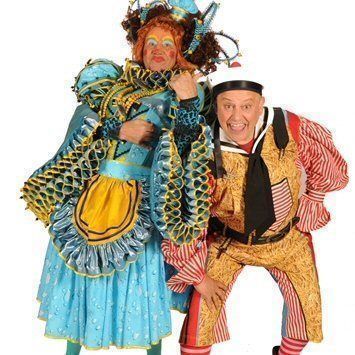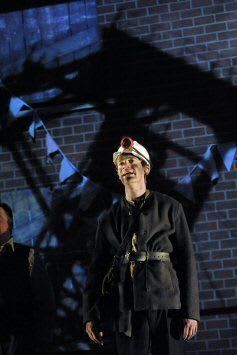Theatres
Because of the reduction in funding, there was a marked increase in co-productions in 2012.
Although Newcastle’s Live Theatre began its year with a totally in-house production, Zoe Cooper’s Nativities in February and March, and followed it in the summer with its own production The Prize for the Edinburgh Fringe, all its other shows were co-produced: Geordie Sinatra in April / May with the Stephen Joseph in Scarborough, Utopia (June in Newcastle and June / July in London) with the Soho, and Chalet Lines which played at the Bush (April / May) and in Newcastle (September/ October) but with totally different casts although it was the same production. In November it also hosted another co-production with Paines Plough and Salisbury Playhouse, Simon Stephens’s London.
During 2012, too, Live’s year-long national tour and West End residency of Lee Hall’s The Pitmen Painters finished its London run, although it was announced at the end of the year that the production is to set out on a new seven venue tour in March and April.
Live also co-produced Northern Stage’s major production of the first half of the year, Close the Coalhouse Door (April/ May followed by a national tour).
Northern Stage’s other production, apart from its Christmas shows (The Little Detective Agency, which continues until 5th January, and The Borrowers) was Margaret Wilkinson’s Blue Boy, co-produced with New Writing North, Darlington Civic Theatre, Durham Book Festival and the Customs House in South Shields.
In a major new departure Northern Stage took over Edinburgh Fringe venue St Stephen’s this year where it presented a revival of its September 2011 production Oh, the Humanity and Other Good Intentions, this time in association with the Soho, as well as a number of other northern productions, some of which were developed at the Newcastle venue.
In addition, of course, Northern Stage staged a wide programme of touring productions, including Wayne McGregor’s FAR, Frantic Assembly’s Beautiful Burnout and Headlong’s Medea.
The Customs House other main productions of the year were another co-production, The Awkward Squad (with Fresh Glory Productions and the Guild of Lillians), which went on to play a month at the West End’s Arts Theatre before a short run at York Theatre Royal, and The Mysteries which had an amateur cast and a professional creative team.
The Customs House also had its panto, Dick Whittington, which this year saw the final performance by Bob Stott as Dame Dotty, bringing to an end a 30+ year partnership with the theatre’s director Ray Spencer as Tommy, the comic role.
There were no in-house productions at the Gala in Durham (except, of course, for the panto Sleeping Beauty) for the second year running, although the theatre did present the première of balletLORENT’s dance piece for children Rapunzel there.
Apart from pantos, none of the other North East theatres presented in-house productions, except for dance venue Dance City which ventured a toe in the theatrical water, in association with children’s literature organisation Seven Stories, with a short but successful run of a non-panto version of Jack and the Beanstalk in December.
A new venue did emerge during the year. Following a successful one-night transfer of Pink Lane Productions’s Arctic Convoy to the Low Lights Tavern on the Fish Quay in North Shields in January, local theatre company Cloud Nine put on two performances of short plays there, Company by Dick Curran and Marmite, or a Goat in the Wilderness by Peter Mortimer.
ARC Stockton has begun to make a name for itself for spoken word performances and new writing. Although the venue does not actually produce any work itself, in the sense of funding it, it does offer support and rehearsal space to small companies and even individuals and this work has grown considerably during the year.
The larger theatres in the region—Newcastle Theatre Royal, which celebrated its 175th anniversary this year, and Sunderland Empire—continue to attract West End hit shows, with the Empire concentrating on musicals and ballet and the Royal bringing in companies like the RSC and Propeller, as well as touring productions like One Man, Two Guvnors from the National Theatre and regular visits from Opera North.
Darlington’s Civic Theatre, being smaller, is not able to accommodate such large shows but does bring in mid-scale drama and musical productions, as do the Mill Volvo Tyne Theatre in Newcastle, Billingham Forum and the Middlesbrough Theatre. The Georgian Theatre Royal in Richmond has become a little more adventurous in its programming during the year, bringing in a wider range of small-scale productions than before.
Other small venues—the Customs House, Alnwick Playhouse, the Queen’s Hall in Hexham and the Maltings in Berwick (and, to a lesser extent, the Whitley Bay Playhouse)—continued to provide a wide variety of small-scale touring shows.
Unfortunately one venue was lost during the year.
Finally, in spite of a spirited fight by its supporters, Darlington Arts Centre closed its doors because the town council felt unable to continue to support it financially.



